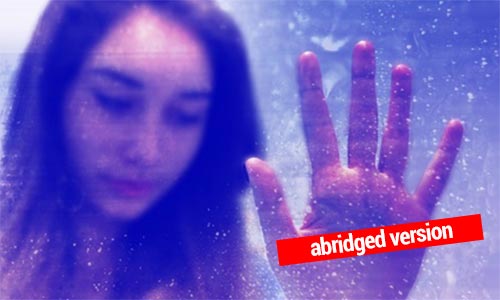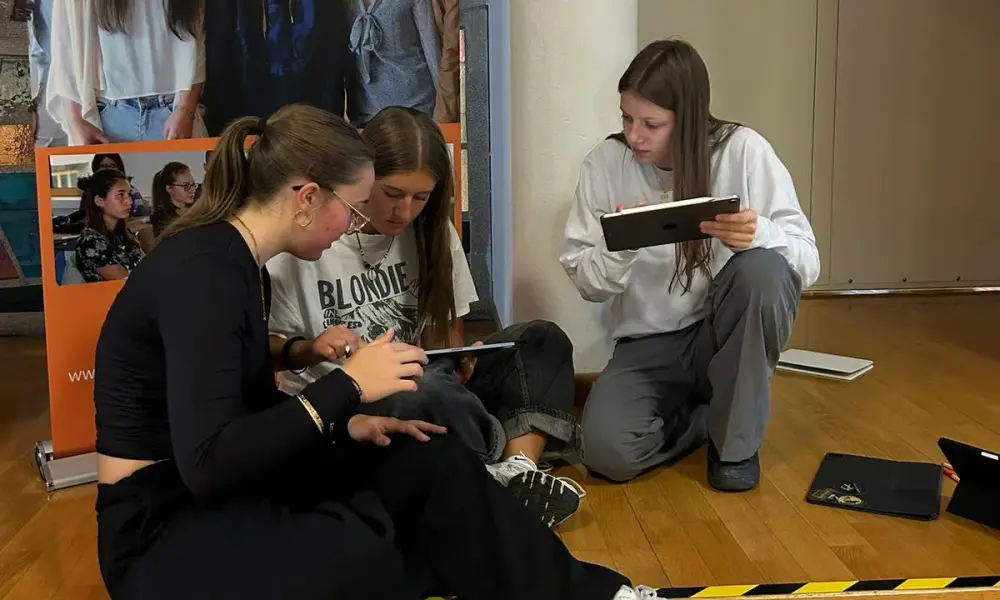
Girl looking down – Picture: Richard Kammerer
Students of the classes 2C, 2D, 4B, and 4D (schoolyear 2015/16) from the Higher Secondary Business College in Bruneck (South Tyrol-Italy), write a letter to Mark Zuckerberg and make a suggestion.
It’s about answering the following questions: How can Facebook prevent one’s privacy from being invaded, if a picture is published on the internet, and how can these people’s consent be obtained?
Here’s the letter:
Re: New Facebook philosophy regarding pictures on the internet and protection of privacy
Dear Mr. Zuckerberg,
In the letter you wrote to your newborn daughter you state that you intend to make the world a better place and that you’re willing to invest a lot of money to do that.
We, some students from the classes 2C, 2D, 4B and 4D (schoolyear 2015/2016) from the Higher Secondary Business College in Bruneck (South Tyrol-Italy), believe we could contribute a good idea.
We are sure that your idea is definitely a good one, but we also think that changing the world can only be a success if everyone starts with his/her own surroundings. That’s why we would like to tell you a little story, which could happen at any time, anywhere. The title of this story is Noli me tangere, which is Latin and means: Don’t touch me!
15-year-old George takes a picture of 15-year-old Johanna (both names are invented, both of them are Facebook-users) at a private party which he wasn’t even invited to. He threatens Johanna by saying that he wants to upload it onto the internet. For Johanna, who jealously guards her privacy, this would be a nightmare. She’s sure that only she has the right to do something with her picture, but she also imagines the worst: what would happen if she wanted to do a practical training in a bank, but the bank director saw her picture (in which she’s half-naked, heavily made up and totally defaced thanks to an image editing program) on the internet. Saying that the picture was uploaded against her will would certainly not make a difference. The bank director would not risk endangering the bank’s good reputation and that’s why he wouldn’t let her do the practical training.
Now we need to ask ourselves, if Johanna is actually at George’s mercy or if someone is responsible for protecting her.
Very important questions related to this topic are: How can Facebook prevent violation of privacy and how can the consent of the person in question be obtained?
According to Italian legislation, the parents of under-16-year-olds should be asked for permission also because George’s intentions are considered a crime according to article no. 615 (violation of privacy) of the Italian penal code. According to article no. 40/2, also Facebook has committed a crime if it did nothing to prevent it from happening. Facebook is considered not guilty only if it can prove that it did everything to prevent it (article no. 2050 from the Italian civil code).
And this is the point:
We’re sure that it’s possible for Facebook to prevent such a picture from being uploaded without permission of the people in this picture. We are thinking of a facial recognition technology, which would work like this:
Facebook-users who want to protect their pictures leave a picture and their personal digital signature when they register with a special database. The picture has to be updated at regular intervals. If someone’s under 16, the parents’ signatures are also needed because they also have to give permission. In this case the data of the under-16-year-olds have to be linked to the parents’ data. If a Facebook-user wants to upload another user’s picture, he has to add the digital signature of the person shown in the picture to the picture itself. Facebook then uses a facial recognition technology to see if the face actually matches the signature. Only then is it possible to upload the picture. If that person’s identity cannot be determined and confirmed, the picture can’t be published. That would be the case for Facebook-users, who have not left a picture and/or a digital signature during the registration, or people who don’t have a Facebook-account.
If Facebook succeeded in developing this kind of technology, their prestige would increase and it would gain more users looking for a safe way to use social media on the internet. This artificial intelligence could be used to protect users’ human rights (in this case user privacy on the internet). The same idea could then also be applied to other human rights and the new Facebook-philosophy could be called:
Artificial intelligence protecting human rights
Just imagine Johanna were your daughter ....
Best regards,
some students from the classes 2C, 2D, 4B and 4D (schoolyear 2015/16) from the Higher Secondary Business College in Bruneck (South Tyrol-Italy) with their teacher in legal studies.
We would appreciate your reply to:
Translated from German into English by Janine Niederkofler, 5D



